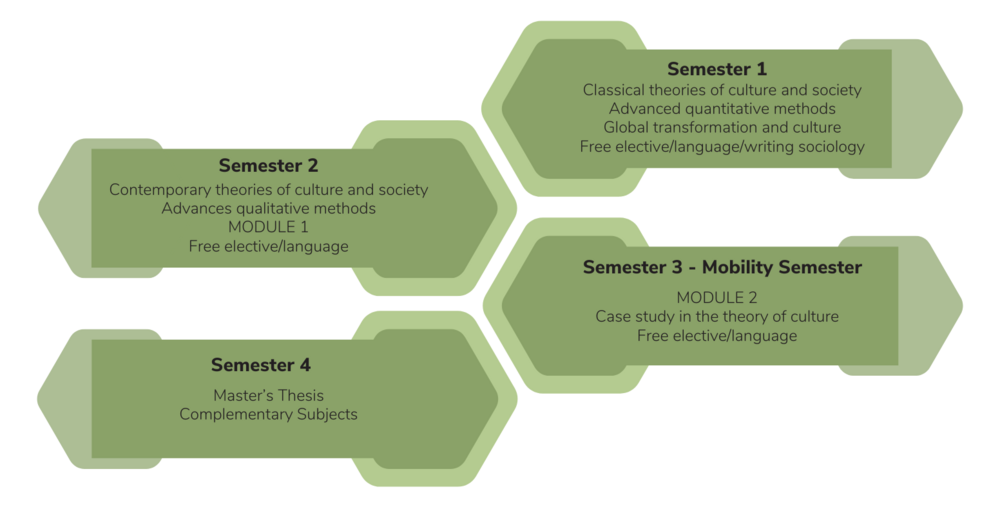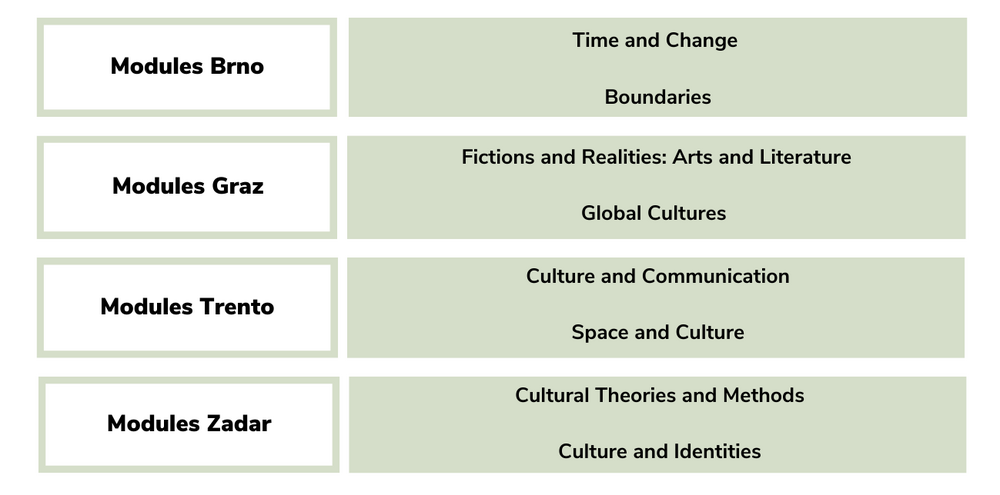You are fascinated by the dynamics, the complexity, and the interaction between social, cultural and economic processes and systems. You would like to analyze scientific topics within the field of cultural sociology by applying state-of-the-art theoretical and methodological approaches.
This is the study path to become an expert in social and cultural analysis!
The mixture of courses you will take during your stay in at least two of our universities will deepen your knowledge about the socio-cultural processes which shape our world. Cultural sociology aims at studying the complex interaction of culture with social, political, and economic processes and structures within a broad range of current societal issues (e.g. migration, urban development, social stratification, social movements). We provide insights into how cultural practices take part in the production of social cleavages and how at the same time they are also shaped by these cleavages.
Cultural Sociology is a subject that requires a highly inter-disciplinary perspective.
You will get a thorough introduction into various aspects of cultural sociology and have the choice of specialized modules to be completed at your entrance and mobility universities as well as free electives and language courses. A master's thesis and examination will round up your joint degree programme.
In semester 2 and semester 3 of your studies, you will therefore have the opportunity to choose modules according to your interest and specialization.
Description: The study of time and change can be approached through examining a number of processes, such as collective memory, narratives, and identities, and the social shifts these phenomena bring about.
Description: The analytical lens of boundaries and boundary work offer a conceptual framework not only for the study of migrants and refugees but also any processes of delineating "us" and "them" or "sacred" and "profane".
More information here: Cultural Sociology | MU Faculty of Social Studies
Description: Fictions and Realities focuses on cultural practices and institutions like literature, art, music, theatre, film, new media as well as forms of material culture (e.g. technique, architecture). These phenomena are analyzed in regard to their social embedding and shaping as well as in regard to their relationship to political/social utopias.
Description: Global Cultures focuses on the complex relationship between processes of globalization and socio-cultural phenomena. Pertinent topics include migration, values, knowledge, religion and politics.
More information here: Curriculum - UNIGRAZonline - Karl-Franzens-Universität Graz
Description: Together with the basis of social and cultural theory, Culture and Communication focuses on sociological approaches to communication, language, science and society. It covers the areas of discourse analysis, social interaction, public understanding of science, and the communication of science. This module develops the theory and methods for the empirical study of contemporary cultural and communication phenomena.
Description: Together with the basis of social and cultural theory, Space and Culture tackles major concepts, theories and issues in contemporary social theory concerning sociospatial phenomena, the study of urban cultures, and the theoretical and empirical cultural dimension of migration studies. Its aim is to develop research skills in ethnographic settings and connect them back to the urban study scholarship.
More information here: Sociology and Social research - UniTrento
Cultural Theories and Methods
Culture and Identities
More information here: Study programme - courses (University of Zadar)

Mobility
The study programme provides for an integrated mobility semester (30 ECTS credits) as a mandatory requirement for graduation. You can spend this mobility semester at any partner institution in the consortium (except at your entrance university). Different specialization perspectives are offered by the partner universities. Within each perspective, the allocation to the perspective and thus your possible specialization depends on your specific undergraduate education.
Missing ECTS credits can be made up at a summer or winter school if an appropriate course is offered and/or recognized by the consortium. Pre-accreditation of summer or winter school courses by the entrance university is obligatory. Exams can be retaken depending on the respective regulations at your mobility institution.
When applying, you are asked to indicate your preferred mobility universities. The Selection Committee will then make the final decision on your placement. It will take your wishes into account as much as possible, but must also consider the availability of places at the individual universities. After the selection meeting, you will be informed about the mobility university together with the selection result.
Be sure to check all the available courses and modules at each partner university in order to make the choice of your mobility semester reflect your specialization within the field of Cultural Sociology!
All modules of your mobility semester will be offered in English language.
Mandatory Mobility
The mandatory mobility semester (3rd semester) is organised by your entrance university. The application for a scholarship within the framework of existing mobility programmes is also made at your entrance university (never at the mobility university). Make sure to stay in touch with your coordinators to apply for your mobility within the prescribed deadlines.
You will be integrated into an incoming student support mechanism at the respective partner university. In addition, you can contact the respective academic coordinator or student advisor for academic guidance. Students in their mobility phase are regarded as regular/regular-equivalent students and will be granted normal access to the facilities of the mobility university.
In order to transfer your grades from one university to another, this conversion table is used.
Additional Mobility
You can complete an additional mobility during the fourth semester. The Master’s thesis can be written in a context of a mobility. However, your supervisor must be from your entrance university. It is also possible to complete an internship abroad. Please clarify in advance whether the internship can be recognized for your degree programme.
Be aware that an additional mobility may lead to a prolongation of your studies, as the 4th semester is normally dedicated to the Master’s thesis.
Additional mobility at the partner university
If you would like to complete an additional mobility semester at the partner university where you spent your mandatory mobility semester, please get in touch with the contact person of the Master’s programme and the respective contact person of the mobility programme at your entrance university.
Additional mobility at another university outside the programme
You can also complete an additional mobility semester at a university outside the Master’s programme. Therefore, you must apply for a semester abroad. Please get in touch with the contact person of your entrance university for further information.
Entrance University | Mobility University | Additional Mobility |
|---|---|---|
1st and 2nd semester | 3rd semester | 4th semester |
|
| The Master’s thesis can be written in a context of a mobility. However, your supervisor must be from your entrance university. |


